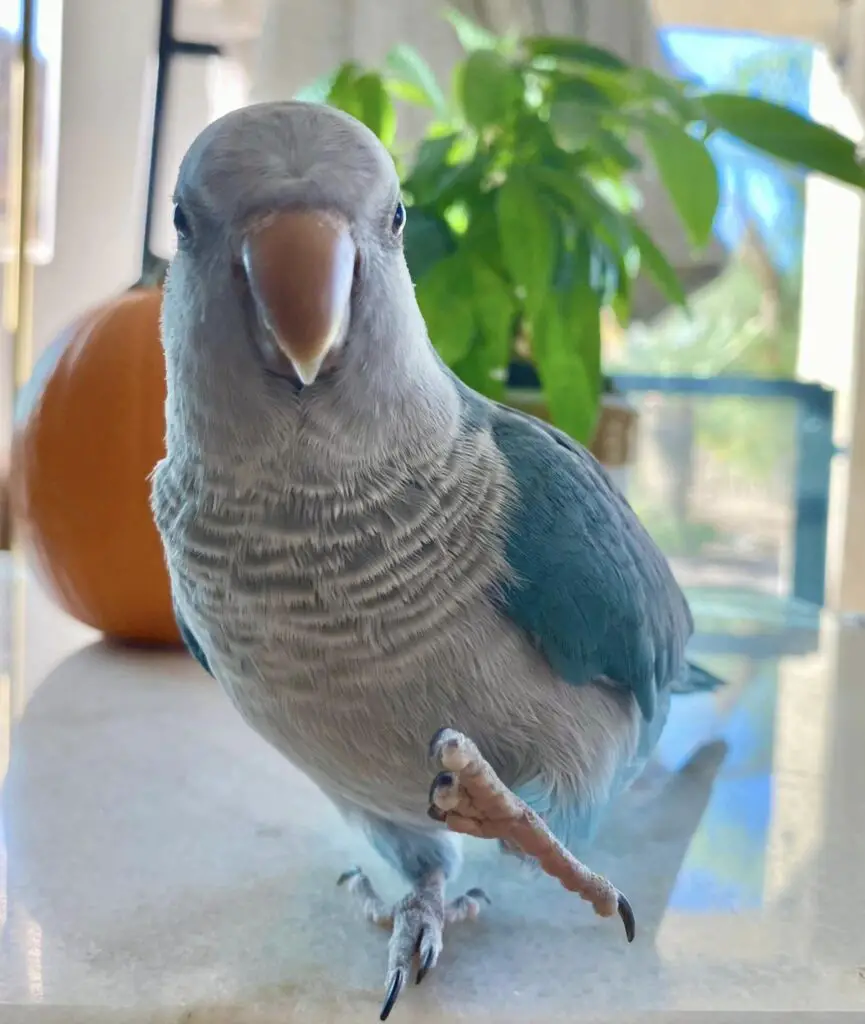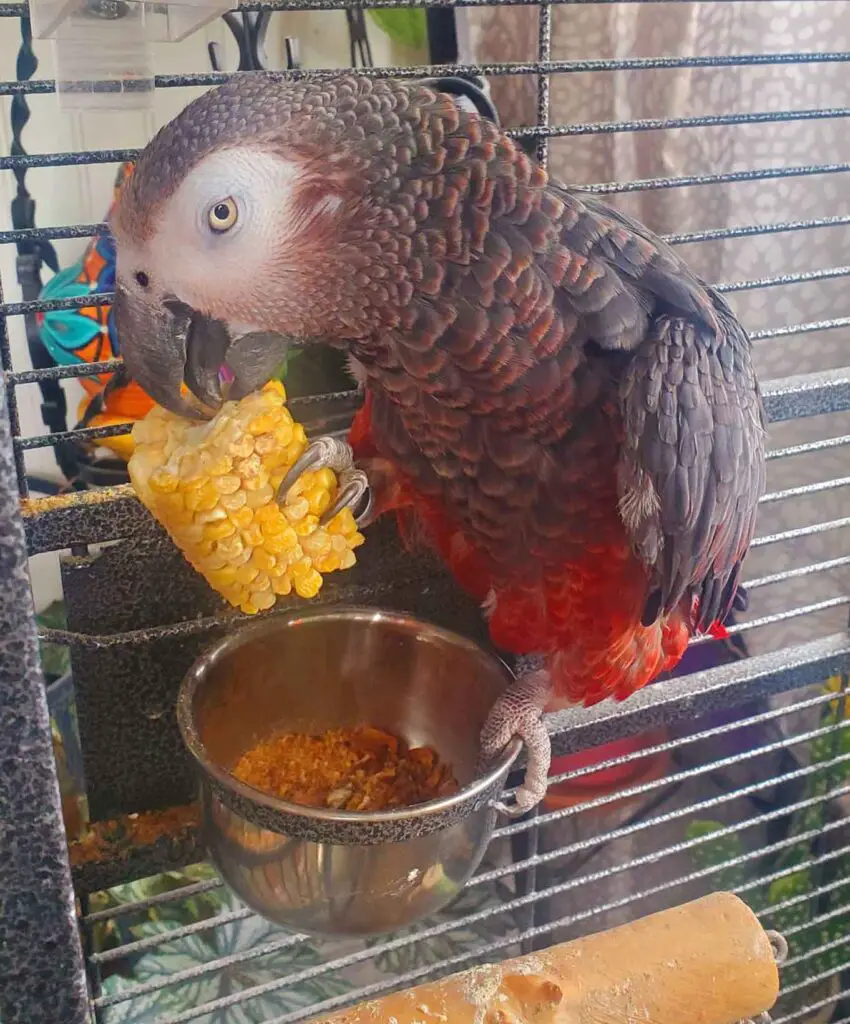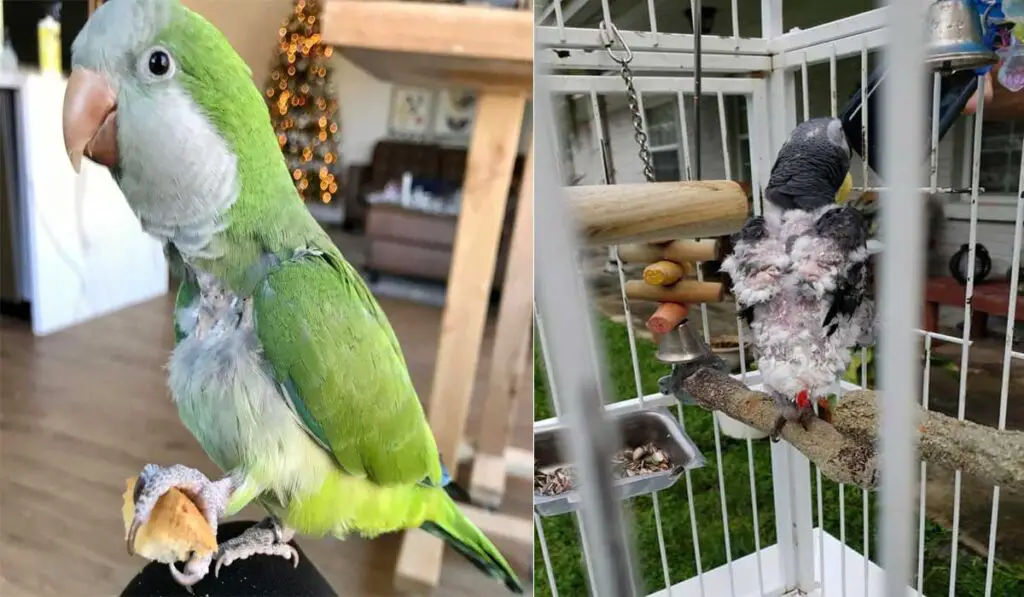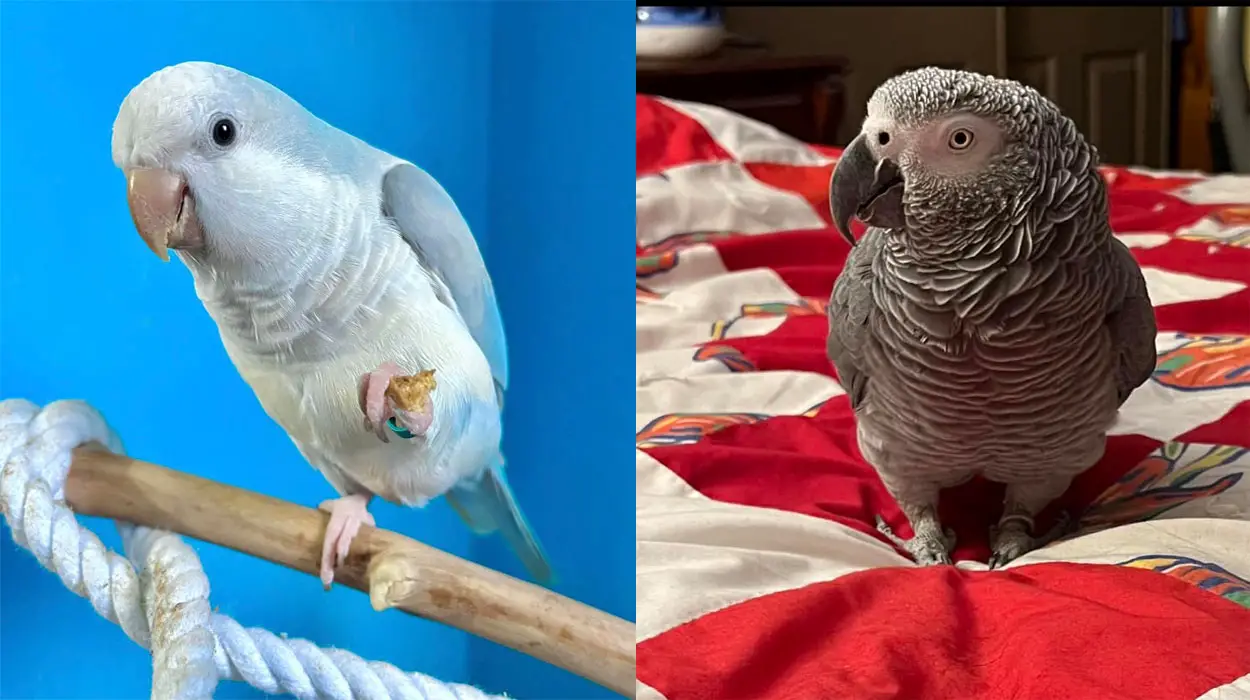African Grey vs Quaker Parrot: Choosing the Perfect Feathered Friend
Embarking on the journey of choosing a feathery companion brings us face to face with the colorful personalities of Quaker Parrots and the regal demeanor of African Greys.
In this exploration, we unravel the nuances that make each species unique, guiding you towards the ideal bird for your lifestyle and preferences.
Understanding their appearances, behaviors, and interactions is key to fostering a harmonious bond with these enchanting creatures.
Key Differences
| Quaker Parrots | African Grey Parrots |
|---|---|
| Legal Status: Illegal in some states and cities of US | Legal in all states and cities |
| Appearance: Various colors, no specific single variation | Light grey body, black beak, red tail |
| Dust Issue: Minimal dust | Significant amount of daily dust |
| Biting: Clear warnings before biting, often for mood reasons | May bite without warning, typically in response to stress |
| Behavioral Issues: Hardier, less prone to feather plucking | More prone to stress and boredom, leading to feather plucking |
| Temperament: Moody, outgoing, and can be social | Temperamentally stable, slightly more docile, less social |
| Housing around Children: Tolerates fast movement, loud sounds, but needs supervision | Easily stressed in noisy environments, not ideal for children |
| Talking Ability: Good talkers, able to mimic sounds and engage in conversations | Renowned as super talkers, exceptional mimicry abilities |
| Intelligence: Intelligent, capable of learning tricks and mimicry | Considered one of the most intelligent birds with high cognitive abilities |
| Handling: Easier to handle, less demanding of constant interaction | Requires more attention and quality time daily to prevent boredom |
| Additional Key Point: Bossy, opinionated, and temperamental; known for unique personalities | Advanced cognitive abilities, including understanding human moods |
Legal Status
First things first, Quakers are illegal in some states and cities of US. These states and cities consider Quakers as pests. They are a threat to native species.
African Grays on the other hand are not illegal in US. You can keep them in all states.

Appearance
Quakers parrots are available in different colors. Wild green to blue, gray green, slaty, attractive yellow (lutino mutation) or white (albino mutation).
In contrast, the African Grey boasts an elegant light grey body, a distinctive black beak, and the crowning glory of a striking red tail. Their appearance exudes a regal charm that sets them apart in the avian world.

Albino mutations have been observed in recent times. In the albino mutation, the entire body is white but the tail is red (not fully albino). Even red factor mutations are seen in some. A red factor mutation causes not only a red color in the tail, but also some red coloration throughout the body.
There are two different species found for African Grey:
- Timneh African Grey
- Congo African Grey
They are almost same in color, slightly darker grey in Timne African Grey with pink patch in beak.
Dust Issue
A household concerned about airborne particles finds solace in the minimal daily dust produced by Quaker Parrots. This makes them not only a visual delight but also suitable for those meticulous about cleanliness.
However, if you fancy the company of an African Grey, be prepared for a significant daily dust production. Regular cleaning becomes a ritual to maintain a tidy and healthy living space for both you and your feathered friend.
Body Language: Biting
Communication is key in the world of Quaker Parrots. They provide clear warnings before resorting to biting, often expressing their moods through various gestures. Their generally gentle demeanor makes them amiable companions.
On the other hand, African Greys may catch you off guard with sudden bites, usually a response to stress or discomfort. They are not well known for providing warnings like Amazon Parrots or Quakers. Understanding their body language becomes bit difficult in fostering a trusting relationship with these majestic birds.

Behavioral Issues
Renowned for their resilience, Quaker Parrots are hardier and less prone to feather plucking, a common behavioral issue in parrots. Their adaptability makes them a sturdy choice for those seeking a feathered friend with enduring wellbeing.
While African Greys possess an unmatched temperament stability, they are more susceptible to stress and boredom, occasionally leading to feather plucking. Owners must be attuned to their bird’s mental wellbeing, providing enriching environments to prevent such behaviors.
Temperament
If you crave a parrot with a dynamic personality, the Quaker Parrot fits the bill. These birds are known for their moodiness, outgoing nature, and sociable tendencies. Prepare for a companion that can switch from playful to contemplative in the blink of an eye.
On the flip side, African Greys exude a slightly more docile temperament and are generally less social. They may not demand constant attention, making them suitable for those who prefer a more laidback avian companion.

Housing around Children
Families with children find joy in the Quaker Parrot’s ability to tolerate fast movements and loud sounds. While they can handle the energy of kids, supervision remains essential to ensure a harmonious coexistence.
African Greys, however, might not be the best fit for households with active children. Easily stressed in noisy environments, these birds thrive in calmer surroundings, requiring a more serene setting for optimal wellbeing.
Talking Ability
Conversations with a Quaker Parrot are nothing short of delightful. They are good talkers, proficient in mimicking sounds and engaging in chitchats. The communicative skills of these birds make them engaging companions, ready to share in your daily conversations. They are just behind Eclectus parrot in terms of talking ability.
When it comes to talking ability, African Greys take center stage. Renowned as super talkers, their exceptional mimicry abilities can leave you astounded. Prepare for a feathered friend that not only listens but actively participates in your verbal exchanges.
Intelligence
Intelligence is a feather in the cap of Quaker Parrots. These birds showcase cleverness, readily learning tricks and mastering mimicry. Their intelligence adds an interactive dimension to the companionship, making them not just pets but intriguing members of the household.
Considered one of the avian Einsteins, African Greys stand out for their high cognitive abilities. Their advanced intelligence enables them to comprehend complex tasks, solving problems with a level of acumen that sets them apart in the avian world.
Handling
Handling a Quaker Parrot is a joy for bird enthusiasts. Easier to handle than some other parrot species, they are less demanding of constant interaction. Ideal for individuals with moderately busy lifestyles, these birds offer companionship without an overwhelming need for attention.
On the flip side, African Greys require more attention and quality time daily to prevent boredom. Those who can invest time in meaningful interaction will be rewarded with a devoted companion. The handling demands may be higher, but the bond forged is deeply enriching.
Additional Key Point
Quaker Parrots are known for their bossy, opinionated, and temperamental nature. Each individual boasts a unique personality, adding a touch of unpredictability to your daily interactions. If you’re seeking a companion with character, the Quaker Parrot’s idiosyncrasies might be just the right fit.
Adding to the African Grey’s allure is their advanced cognitive abilities, including an understanding of human moods. These birds are not just pets; they become astute companions capable of forming a deep emotional connection with their owners.
Closing
Summarizing the distinctive traits of Quaker Parrots and African Greys, it’s evident that each bird brings a unique set of characteristics to the table. From appearances and behaviors to intelligence and handling, the decision ultimately hinges on personal preferences and lifestyle.
As you embark on the exciting journey of choosing a parrot companion, spend time with both species to grasp their unique charm. Whether it’s the vibrant, sociable nature of the Quaker Parrot or the regal intelligence of the African Grey, each bird promises joy and companionship in its own way.
Final Recommendations
Tailor your decision based on your preferences, lifestyle, and the commitment you’re ready to offer. If you seek a colorful, dynamic companion with a touch of unpredictability, the Quaker Parrot might be your match. Alternatively, if you like advanced cognitive abilities and a deeper emotional bond, the African Grey could be the ideal choice. Regardless of your choice, both parrots bring unique joy and lifelong companionship into your home.
